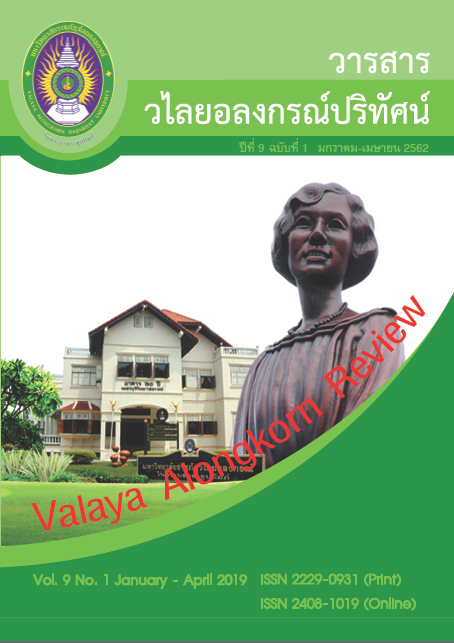การเสริมสร้างคุณธรรมจริยธรรมในศตวรรษที่ 21 เพื่อรองรับองค์การแห่งยุคเศรษฐกิจดิจิทัล
คำสำคัญ:
เศรษฐกิจดิจิทัล, คุณธรรม, จริยธรรมบทคัดย่อ
ในปัจจุบันเทคโนโลยีดิจิทัล (Digital Technology) ได้เข้ามามีบทบาทสำคัญในชีวิต ของมนุษย์แทบทุกด้าน ทั้งด้านสังคมและการทำงาน องค์กรต่าง ๆ จึงต้องมีการปรับการบริหารงานให้สอดรับกับยุคเศรษฐกิจดิจิทัลอย่างมีประสิทธิภาพ เพื่อคงไว้ซึ่งผลประกอบการที่ดีและ ความเจริญเติบโตขององค์กร ไม่ว่าเทคโนโลยีดิจิทัลจะเติบโต และมีบทบาทมากมายเพียงใด แต่สิ่งที่องค์กรควรรักษาไว้ก็คือ คุณธรรมและจริยธรรมภายในองค์กร ซึ่งจากแนวคิด Barney (1991) เกี่ยวกับทรัพยากรภายในองค์กรที่มีคุณค่าผู้บริหารองค์กรควรศึกษาและทำความเข้าใจในเรื่องดังต่อไปนี้ 1) การศึกษาองค์ประกอบที่มีผลต่อองค์กรเพื่อรองรับกับการเข้าสู่เศรษฐกิจดิจิทัล แบ่งเป็น 2 ส่วน คือ 1.1) ระดับนโยบาย หมายถึงการจัดการด้านโครงสร้างขององค์กรเพื่อปรับให้เข้ากับสิ่งแวดล้อมภายนอก 1.2) ระดับปฏิบัติการ หมายถึง การมุ่งเน้นที่ปัจจัยภายในขององค์การ 2) การศึกษาคุณธรรมและจริยธรรมในยุคเศรษฐกิจดิจิทัลของประเทศไทย แบ่งเป็น 2 ด้าน ดังนี้ 2.1) ด้านคุณธรรม คือ คุณความดีที่เกิดขึ้นในจิตใจและแสดงออกเป็นพฤติกรรมที่ดีของบุคคลนั้น 2.2) ด้านจริยธรรม คือ หลักแห่งความดีงามที่สังคมให้การยอมรับว่าควรนำไปประพฤติปฏิบัติ ซึ่งแนวคิดด้านคุณธรรมและจริยธรรมนี้มีพื้นฐานสำคัญมาจากหลักศาสนา (Religion) โดยสามารถนำมาประยุกต์ใช้กับ การบริหารองค์กรเพื่อรองรับการเข้าสู่เศรษฐกิจดิจิทัล และ 3) การพัฒนาคุณธรรมและจริยธรรม ในองค์กรควรเริ่มจากผู้บริหารที่ต้องมีจริยธรรมในการปฏิบัติงาน เช่น ความเสียสละ ความซื่อตรง ความยุติธรรม เป็นต้น เพื่อเป็นแบบอย่างที่ดีแก่พนักงาน ไม่ว่าโลกจะเปลี่ยนไปอย่างรวดเร็วเพียงใดแต่องค์กรยังจำเป็นต้องใช้ระบบคุณธรรมและจริยธรรมเข้ามาเชื่อมโยงให้องค์กรมีความเจริญเติบโตควบคู่ไปกับความสงบสุขของสังคมสืบไป และผู้เขียนมีข้อเสนอแนะในการเสริมสร้างคุณธรรมและจริยธรรมสำหรับองค์กรที่จะก้าวสู่เศรษฐกิจดิจิทัล 3 ด้าน คือ ด้านนโยบาย ด้านบริหารจัดการ และ ด้านวิชาการ
เอกสารอ้างอิง
เกรียงศักดิ์ เจริญวงศ์ศักดิ์. (2560). องค์กรแห่งยุคเศรษฐกิจดิจิทัล. กรุงเทพฯ: หนังสือพิมพ์กรุงเทพธุรกิจ.
เกสรา ศักดิ์มณีวงศา. (2561). เตรียมความพร้อมให้องค์กรยุคดิจิตอล. [ออนไลน์], เข้าถึงได้จาก: http://www.bangkokbiznews.com/blog/detail/644094 (2561, 2 กรกฎาคม).
ไชย ณ พล อัครศุภเศรษฐ์. (2550). การสร้างสรรค์นวัตการ. กรุงเทพฯ: เคล็ดไทย.
ดนัย จันทร์เจ้าฉาย. (2552). กลยุทธ์น่านน้ำสีขาว. กรุงเทพฯ: ดีเอ็มจี.
ดนัย จันทร์เจ้าฉาย. (2560). ประเทศไทย 4.0 กับคุณธรรม 4 ประการ. [ออนไลน์], เข้าถึงได้จาก: http://marketeer.co.th/archives/129863. (2561, 23 กรกฎาคม).
ธนา ศิริวัลลภ และชัยพงษ์ พงษ์พานิช. (2553). การบริหารการเปลี่ยนแปลงองค์กร. นนทบุรี: โรงพิมพ์มติชนปากเกร็ด.
ลักษณารีย์ ยิ่งเกรียงไกร. (2557). ปัจจัยที่ส่งผลต่อความตั้งใจซื้อสินค้าแฟชั่นผ่านทางอินเทอร์เน็ตของผู้บริโภค ในเขตกรุงเทพมหานคร. วารสารวไลยอลงกรณ์ปริทัศน์. 4(1): 1-12.
ปิยนันท์ สวัสดิ์ศฤงฆาร. (2556). รูปแบบการพัฒนาคุณธรรมในองค์กร. [ออนไลน์], เข้าถึงได้จาก: http://oknation.nationtv.tv/blog/piyanan/2013/12/01/entry-1 (2561, 2 กรกฎาคม).
พระธรรมโกศาจารย์ (ประยูร ธมมจิตโต). (2552). วิธีบูรณาการพระพุทธศาสนากับศาสตร์สมัยใหม่. นครปฐม: มหาวิทยาลัยมหาจุฬาลงกรณ์ราชวิทยาลัย.
พระมหาหรรษา ธมฺมหาโส. (2557). พระพุทธศาสนาเข้ากับวิทยาการสมัยใหม่. พระนครศรีอยุธยา: มหาวิทยาลัยมหาจุฬาลงกรณ์ราชวิทยาลัย.
พิธุวรรณ กิติคุณ. (2559). ภาครัฐไทยกับการก้าวสู่รัฐบาลดิจิทัล. [ออนไลน์], เข้าถึงได้จาก: http://www.parliament.go.th/library. (2561, 25 มิถุนายน).
สันติ บางอ้อ. (2553). การสร้างคุณภาพชีวิตที่ดีในการทำงาน. Productivity World.
อนิวัช แก้วจำนงค์. (2556). จริยธรรมทางธุรกิจ. (พิมพ์ครั้งที่ 2). สงขลา: นำศิลป์โฆษณา.
Barney, J. (1991). Firm resources and sustained competitive advantage. Journal of Management. 17, 99-120.
Carroll & Buchholtz, K. A. (2005). Business & Society: Ethics and Stakeholder Management. (5th ed.). U.S.A.: Thomson.
Donaldson, L. (1996). The normal science of structural contingency theory. In S.R. Clegg, C. Harddy, and W.R. Nord (Eds.) The Sage handbook of organization studies (pp. 57-76). London: Sage.
Ferrell, O. C. (2001). The Role of Ethical Leadership in Organizational Performance. Journal of Management System. 3(Summer): 64-78.
Griffin, Ricky W. (1999). Management. (6tth ed). Boston, MA: Houghton Mifflin Company.
Hartline, M & Ferrell, O. C. (1996). The Management of Customer-Contact Service Employees: An Empirical Investigation. Journal of Marketing. 60(October): 52-70.
ดาวน์โหลด
เผยแพร่แล้ว
รูปแบบการอ้างอิง
ฉบับ
ประเภทบทความ
สัญญาอนุญาต
ข้อความที่ปรากฏในบทความแต่ละเรื่องในวารสารวไลยอลงกรณ์ปริทัศน์ เป็นความคิดเห็นของผู้นิพนธ์แต่ละท่าน มิใช่เป็นทัศนะและมิใช่ความรับผิดชอบของกองบรรณาธิการจัดทำวารสาร และ
มหาวิทยาลัยราชภัฏวไลยอลงกรณ์ ในพระบรมราชูปถัมภ์


